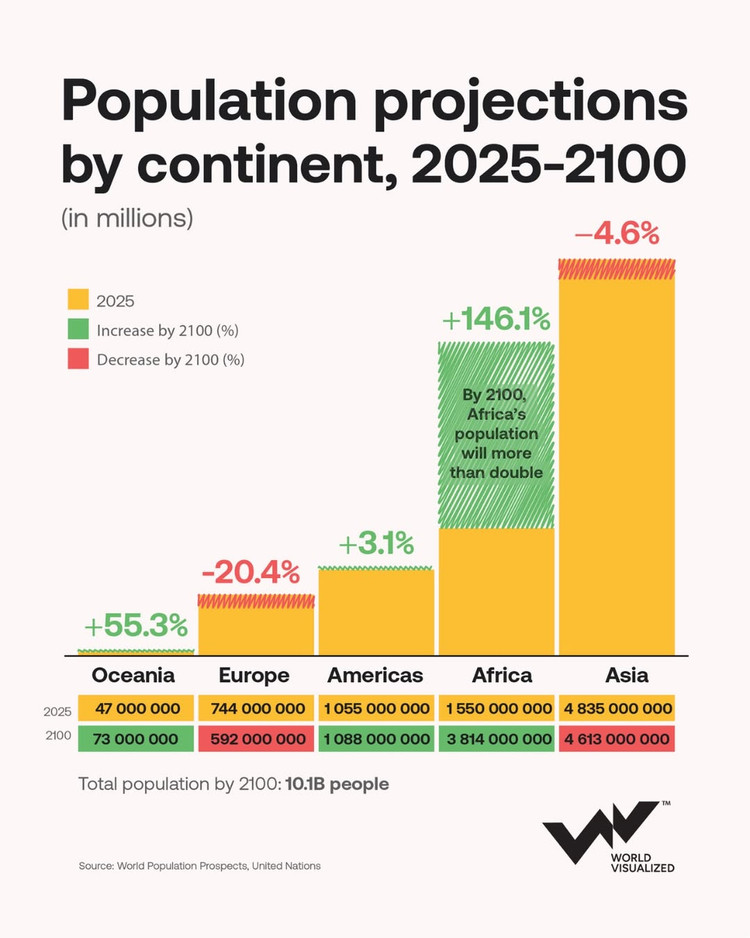Tag: Europe
Global population growth is entering a new phase as the United Nations World Population Prospects projects that the world’s population will reach about 10.1 billion people by 2100, with almost all net growth coming from Africa, while Europe and parts of Asia decline.
Nigeria, Africa’s most populous nation, is now giving birth to more babies each year than all of Europe plus Russia combined, a milestone that reflects profound global demographic change.
When you look at a world map of naval power, almost all nations sail conventional warships and carriers. But only a tiny club of nations has mastered nuclear-powered aircraft carriers, massive ships that act as mobile airfields and can stay at sea for years without refuelling. What this really means is strategic reach and influence that most fleets can only dream of.
From casual hellos between friends to formal exchanges at family gatherings, cheek kissing remains one of the most recognisable and misunderstood forms of greeting worldwide.
Security used to feel distant for many Europeans because it could only be realised through alliances, treaties, and far-off capitals. That sense of distance is fading as a majority of Europeans now support the idea of a unified armed force.
The global economic recovery is set to remain uneven in 2026, with emerging economies driving growth while much of the developed world continues to slow.
Cinnamon feels universal. It shows up in kitchens from Accra to Amsterdam, in everything from breakfast oats to festive desserts. But behind that familiar warmth is a global trade that’s far more concentrated than most people realise.
Global demand for vitamins continues to rise, driven by ageing populations, expanding healthcare systems and a growing focus on nutrition and preventative health. New trade data from World’s Top Exports shows which countries are importing the most vitamins by value, and the results highlight clear economic and industrial patterns.
Global trade in vitamins and dietary supplements is increasingly concentrated among a small group of advanced manufacturing economies, with Germany and the United States emerging as the world’s largest exporters by value, according to data from World’s Top Exports.
Across Europe, birth rates tell a changing story. According to new findings from the Pew Research Center, Muslim families are having more children on average than non-Muslims, a pattern that is reshaping the region’s population dynamics.
Europe is widely seen as a basin of prosperity, with advanced economies, generous welfare systems, and high standards of living. Yet, in many European nations, nearly a third of the population faces poverty.
Europe is now home to the highest residential electricity costs in the world, averaging around USD 0.245 per kilowatt-hour between 2023 and 2025.
From January 2022 to June 2025, the United States is credited with roughly US$126.1 billion in aid to Ukraine, while the European Union and its institutions provide about US$69.5 billion.
As geopolitical tensions simmer across multiple continents, a new ranking from Global Firepower reveals how conventional military power is concentrated in Asia and Europe in 2025.
One would think that washing hands with soap and water would become second nature for everyone after the pandemic. Surprisingly, some countries still find it difficult to do this even after using the toilet.
The European medical technology industry is a significant employer, with a substantial workforce driving innovation and growth in the sector, according to MedTech Europe.
Healthcare expenditure is a critical aspect of a country's budget, reflecting its commitment to providing quality medical care to its citizens.
The popularity of baby names in Europe differs from country to country, but some names have managed to gain widespread appeal across the continent.



















